#jewish dancers
Text

Arabelle Raphael
Gender: Female
Sexuality: Pansexual
DOB: 27 February 1989
Ethnicity: French, Tunisian, Iranian-Jewish
Nationality: French / American
Occupation: Adult actress, sex worker, dancer, activist, artist
Note: Don't Google if under 18.
#Arabelle Raphael#pansexuality#female#pansexual#1989#biracial#french#asian#tunisian#iranian#jewish#sephardi jewish#adult actor#sex worker#dancer#activist#artist#popular#popular post
212 notes
·
View notes
Text
The Aleph ballet · Virt and Leman
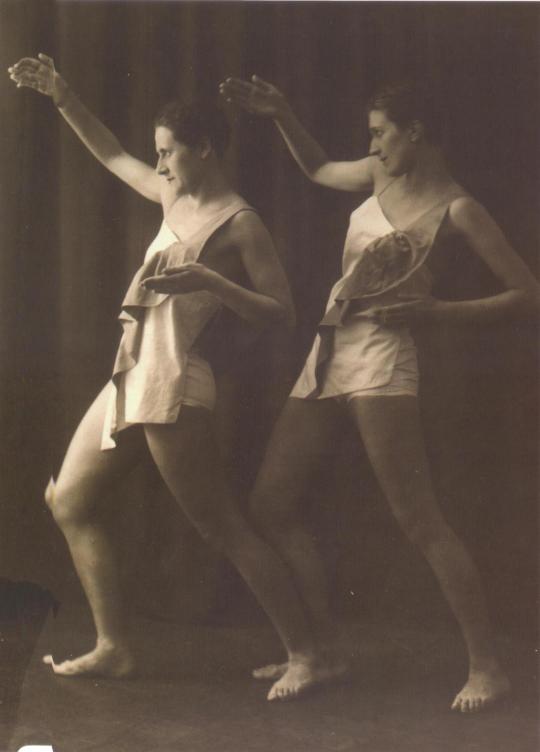
The dancers Galina Virt and Tatiana Leman. Jewish pantomime ballet “Aleph” (part or cycle 1: Jewish Bas-Reliefs). Choreographed by Vera Shabshai (1929) | src FGIS Goscatalog
From 1926 to 1934, Vera Shabshai (1905 – 1988) created about a hundred miniatures ballets, mainly on Jewish themes, to the music of composers from the…
view & read more on wordPress
#vera shabshay#aleph#Jewish dances#dance pose#tanzpose#dancer#Tänzerin#danseuse#Galina Virt#Tatiana Leman#danzatrice#bailarina#1920s#Jewish ballet#Jewish pantomime#late 1920s#Tatyana Leman#Vera Kagan - Shabshay#Vera Kagan Shabshay#vera shabshai#vera shabshaj#danseuses#tanzerinnen#danzatrici
31 notes
·
View notes
Text
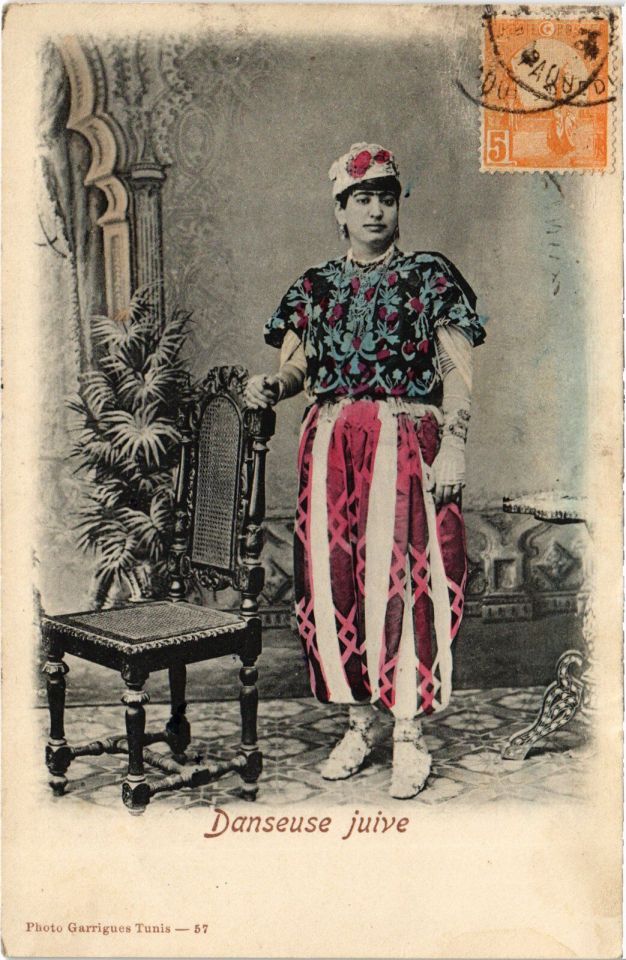
Jewish dancer from Tunisia
French vintage postcard, mailed in 1905 to France
#vintage#tarjeta#france#briefkaart#jewish#postcard#photography#1905#postal#carte postale#sepia#ephemera#dancer#historic#french#ansichtskarte#postkarte#tunisia#postkaart#mailed#photo
4 notes
·
View notes
Text
Cabaret
requested by me!
Kurt Hummel as The Emcee
Brittany Pierce as Sally Bowles
Finn Hudson as Cliff Bradshaw
Quinn Fabray as Fräulein Schneider
Blaine Anderson as Herr Schultz
Noah Puckerman as Ernst Ludwig
Rachel Berry as Fraülein Kost
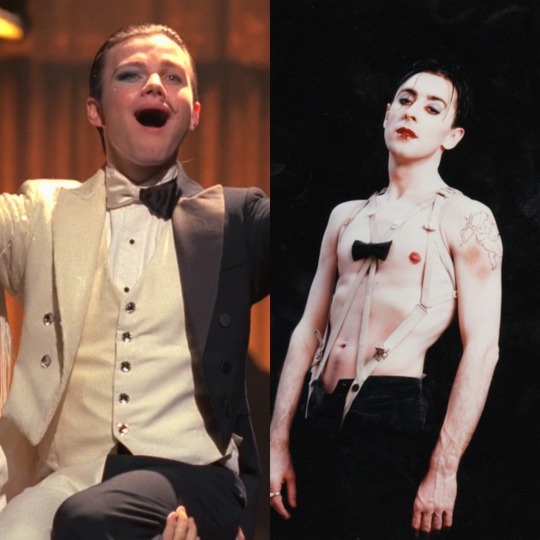




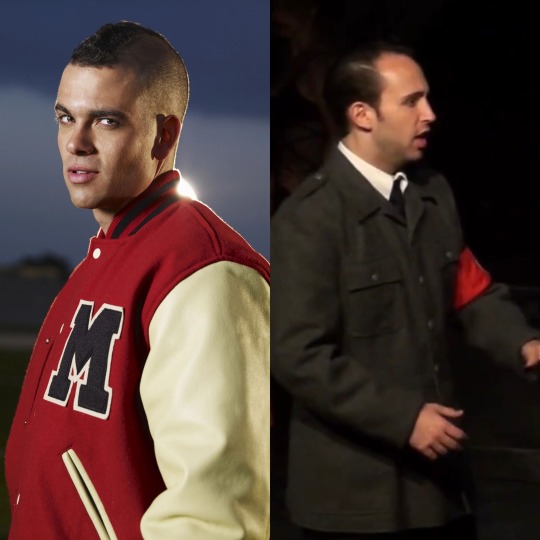

#my instinct was to cast rachel as sally but i feel like she's too polished#brittany is an amazing dancer but as a singer she's overlooked#and heather morris's acting tends to go unrecognized even though she's INCREDIBLE#she's so good at comedy when but they let her do dramatic moments (like shooting star) she fucking DELIVERED#also sally and brittany are very similar#flirty & sexy performers who are too naive & ignore their problems but are actually sensitive & really just want to be loved?#however i do feel uncomfortable with the fact that the only jews i casted are playing nazis...#as a jew myself i don't think an actor has to be jewish to play a jewish character#but given the fact that this subject matter is in a hypothetical high school setting...#like. an education space.#that can get controversial pretty quickly#glee#glee dream casting#cabaret#kurt hummel#brittany pierce#finn hudson#quinn fabray#blaine anderson#noah puckerman#rachel berry
7 notes
·
View notes
Text
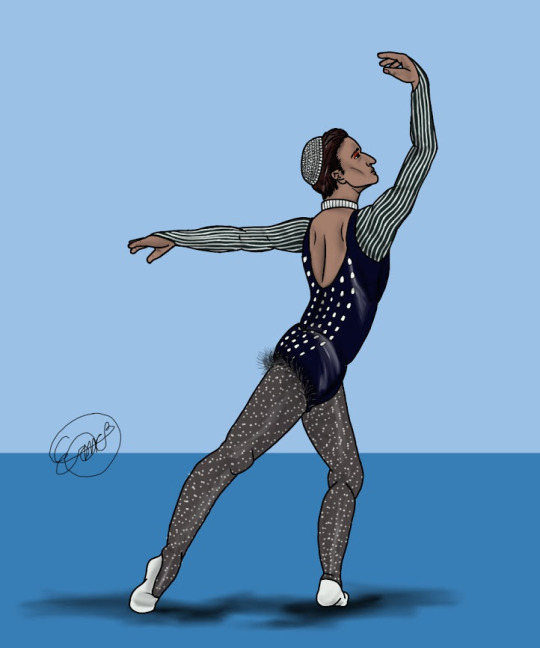
Was inspired by this photo of a loon with a white patch on his head resembling a kippah.
[id in alt text]
33 notes
·
View notes
Text
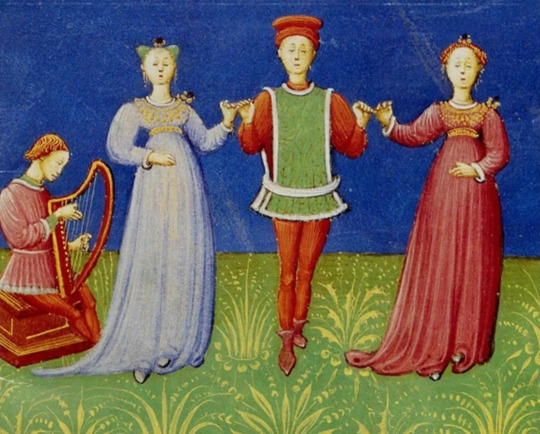
From De pratica seu arte tripudii (On the Practice or Art of Dancing) by Guglielmo Ebreo da Pesaro (c. 1463, Italy)
2 notes
·
View notes
Text
Being creative in Hebrew! Singing, Dancing, or Painting. Which one are you or do you have a different way to create?
Comment Below and don’t forget to sign up for my new Hebrew Course at discounted savings!
http://kck.st/3H8kvGC
#jewish hebrew jew israel education books learn israeli judaism#jewish#hebrew#learnhebrew#hebrewbyinbal#sing#singer#paint#painter#painting#singing#dance#dancer#dancing#artist#create#creativity#creativemornings#creator#express yourself#expression#hebrew langblr#jewish tumblr#how to say
3 notes
·
View notes
Text
A new documentary tracks the story of a 21-year-old street dancer in Mumbai who found an unlikely mentor in a 70-year-old Israeli ballet master. Read The Forward's review.
0 notes
Text
Bella Lewitzky
youtube
Dancer and choreographer Bella Lewitzky was born in 1916 in Llano del Rio, California. Lewitzky created and choreographed more than 40 major dance works. In 1966, she founded the Lewitzky Dance Company, which toured in 43 and 20 countries, and was active for 31 years. Lewitzky was founding dean of the School of Dance at California Institute of the Arts, a position she held from 1969 until 1974. She was also a passionate advocate for artistic freedom. Lewitzky was subpoenaed by the House Un-American Activities Committee in 1951, but refused to answer questions about her political affiliations. She also successfully sued the NEA over an anti-obscenity clause in its grant contracts.
Bella Lewitzky died in 2004 at the age of 88.
1 note
·
View note
Link
#cara williams#december bride#pete & gladys#redhead#actress#singer#dancer#classic tv#classic film#golden age of hollywood#jewish#jew
1 note
·
View note
Photo
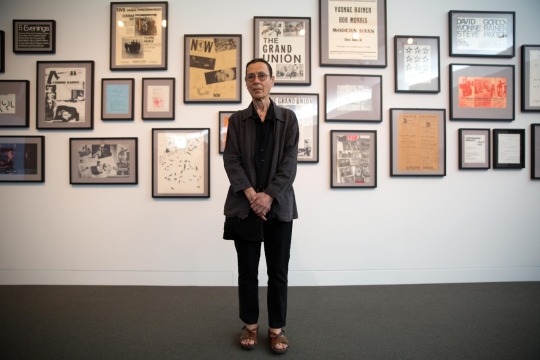
Yvonne Rainer
Gender: Female
Sexuality: Lesbian
DOB: 24 November 1934
Ethnicity: Ashkenazi Jewish
Nationality: American
Occupation: Dancer, choreographer, activist, director, actress, producer
#Yvonne Rainer#lesbianism#wlw#lgbtq#lgbt#female#lesbian#1934#jewish#ashkenazi jewish#dancer#choreographer#activist#director#actor#producer
49 notes
·
View notes
Photo
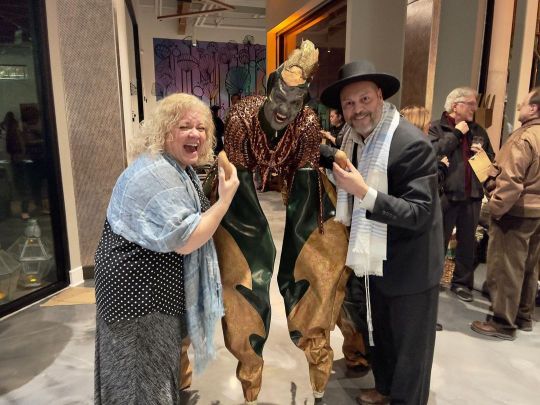
What an amazing performance by the Immersive Theater Ensemble last night! Bravo! 🙌🏼👏🏼🙌🏼👏🏼 • “Golem: Storms of the South” written/directed by @labadabbado and produced by @vonschmals transported visitors into an immersive 19th-century New York marketplace where Jewish immigrants are busy selling their wares on the last day of Hanukkah. We shared incredible real-life stories of how they escaped the “Storms of the South:” ten years of persecution in Western Russia. Upon reaching America, they discovered freedom but brought with them something they could never have imagined. The Golem. • I was very nervous that I wasn’t going to deliver an authentic Russian Jewish Rabbi. I wanted to honor the role and the respect the Judaic religion. I was humbled when I was told by someone from Israel if I was Russian and also Israeli!?! Those words make it all worth while. Spending hours working on the accent, the dialect, learning Yiddish and mannerisms. Along with extensive dialogue. Oy Vey! Thank you! Means a lot! 🙏🏼🙏🏼 • #themitchlemos #immersivetheaterensemble #actor #thespian #singer #dancer #immersivetheater #experience #rabbi #jewish #golem #kaballah #mystic #blessed #grateful #trusttheprocess #godisgood #instagram #instaactor #instatheater #instagood (at Distillery of Modern Art) https://www.instagram.com/p/CmhQLxfr3u2/?igshid=NGJjMDIxMWI=
#themitchlemos#immersivetheaterensemble#actor#thespian#singer#dancer#immersivetheater#experience#rabbi#jewish#golem#kaballah#mystic#blessed#grateful#trusttheprocess#godisgood#instagram#instaactor#instatheater#instagood
1 note
·
View note
Text
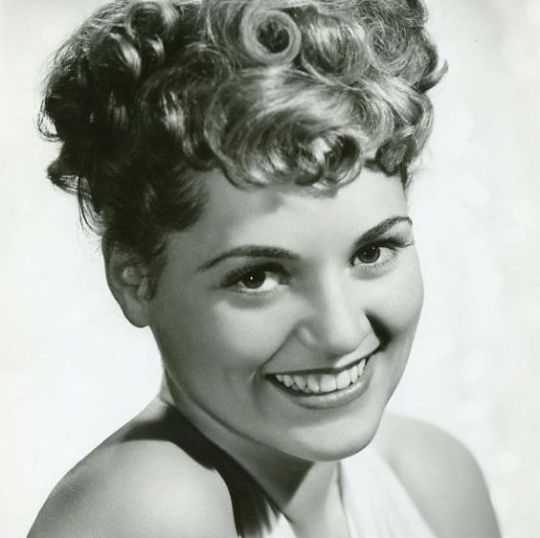
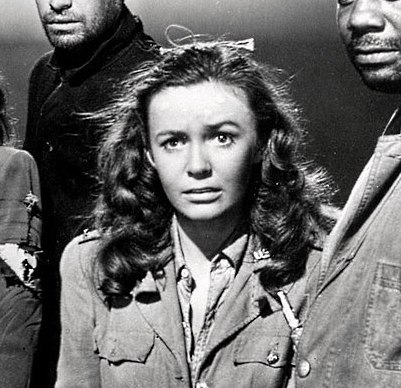
Propaganda
Judy Holliday (Born Yesterday, Bells Are Ringing)—this woman had an IQ of 172!! she was a jewish new yorker!! investigated for communist sympathies and named no names!! tony and oscar winning actress!! leonard bernstein thought of marrying her???? which part of this is not fabulous i ask you that right now
Mary Anderson (Lifeboat)—no propaganda submitted
This is round 1 of the tournament. All other polls in this bracket can be found here. Please reblog with further support of your beloved hot sexy vintage woman.
[additional propaganda submitted under the cut]
Judy Holliday:
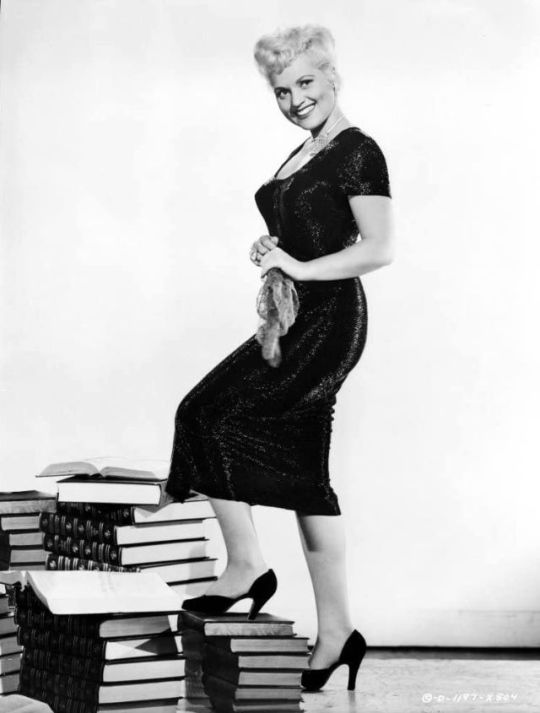
Mostly remembered for beating screen legends Gloria Swanson and Bette Davis at the Oscars for her performance as ditzy blonde Billie Dawn in Born Yesterday, Judy Holliday was an incredible actress whose charm, vulnerability, and humour impressed Katharine Hepburn so much that Hepburn helped her secure the role of Billie Dawn in the screen adaptation of Born Yesterday by getting her a role in 'Adam's Rib', starring Hepburn and Tracy, when Judy was deemed 'too unknown'. Holliday was also an incredibly smart Jewish leftist, who played the ditzy blonde part again when pulled up by HUAC for 'communist sympathies'. She never named names and managed to avoid getting blacklisted. What a queen. She also had an incredible and unique voice and one of the best smiles in the business.
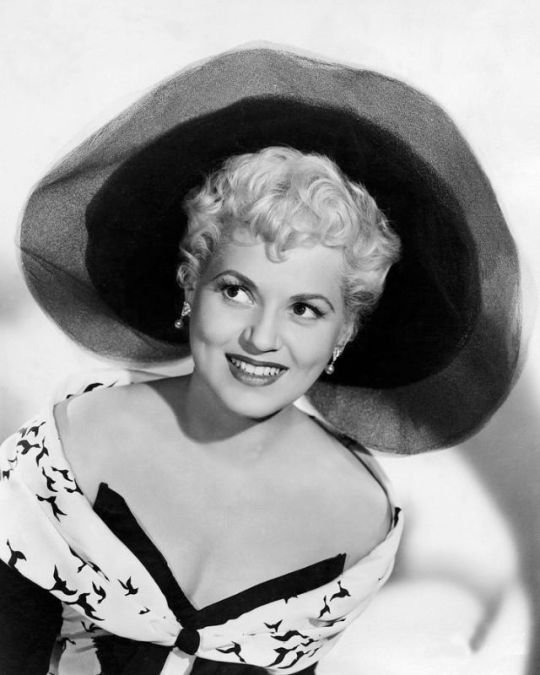
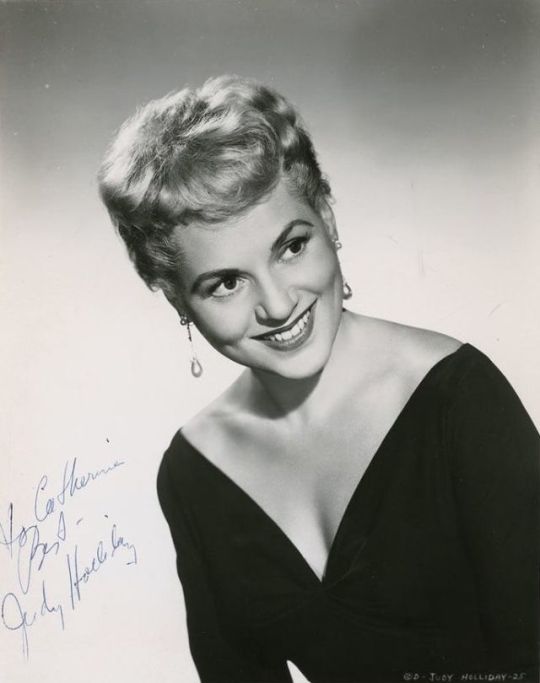
HOT. FUNNY. JEWISH. BLONDE. WOMAN.
She was a singer, dancer, comedienne, and Oscar-winning actress (for Born Yesterday), and she had a gorgeous curvy Cinderella vibe that is everything to me. The part of Lina Lamont in Singin' in the Rain was written for her, but after she won her Academy Award the producers realized she was far too big a star for a supporting role, so her friend Jean Hagen did a perfect impression of how Judy would play it, and she got the part!
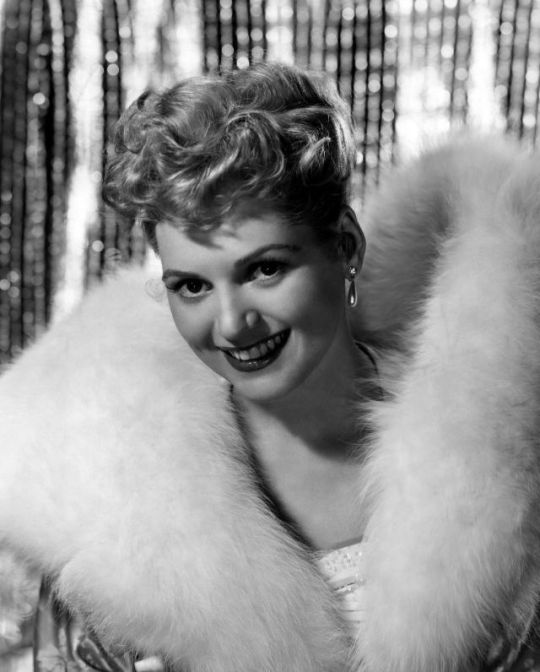
SOMEONE PLEASE TALK ABOUT BELLS ARE RINGING??? HELLO??? THE FUNNIEST COMEDIENNE MY GOD SMART AND FUNNY AND HOT AS HELL?
youtube
Judy Holliday was the whole package--actress, singer, dancer, and comedienne--she lights up the screen in such a powerful way that she outshines everyone else. Here she is in a supporting role in Adam's Rib (1949) giving her statement to lawyer (Katharine Hepburn) on why she shot her cheating husband [editor's note: tw for domestic abuse & murder mentions] In every movie I've seen her in my heart goes out to her, she's so authentic and beautiful. She's proof that it takes smart to play dumb, and can make me laugh and cry in the same scene let alone the same movie. Film historian Bernard Dick on Holliday: "Perhaps the most important aspect of the Judy Holliday persona, both in variations of Billie Dawn and in her roles as housewife, is her vulnerability... her ability to shift her mood quickly from comic to serious is one of her greatest technical gifts." She won the Oscar for Best Actress (beating out Gloria Swanson, Bette Davis, and Anne Baxter) for her performance in Born Yesterday.
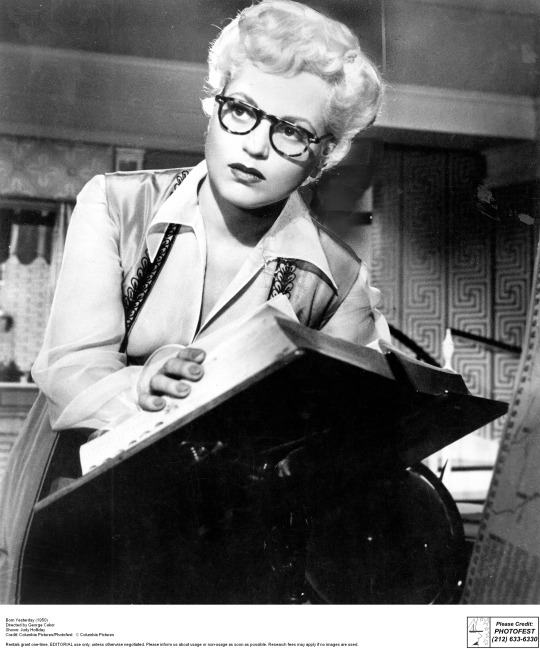
164 notes
·
View notes
Text

BRAVO September 1967
Shortly before his death Brian Epstein admitted to BRAVO-employee Thomas Beyl:
The boys are everything to me
His face was white. His grey suit seemed to be too big. His shirt collar was opened widely, the black tie hanging crookedly of his neck. Brian Epstein had met death. He came from his father's funeral. That hot July day I met Brian Epstein for the last time. Six weeks later he was dead.
As I was taking the list up to Brian's private office, I was desperately thinking about what to say to him. I knew Brian had been very attached to his father. I knew this loss must have rattled him deeply. There rarely had been a conversation with him, where he didn't mention his 'Daddy'.
I didn't feel comfortable in my skin. Even though Brian had promised me once: "Whenever you come to London, come and see me. I'll always have time for you." It had always been like that. But now?
[...] Brian met me at the door. "Hello, Thomas! Do you want something to drink?"
That afternoon I met a completely different Brian Epstein. I was startled when I saw him. He seemed broken and like he had aged years. He stood up from his office chair laboriously. He reached his hand out towards me. It was limp, his handshake without strength. "nice to see you, Thomas", he said. "Have you seen the boys? Have they come back relaxed from Greece?" He tried to act as natural and friendly as usual but he was a bad actor. Brian was quiet for a while, then he said: "I know why you came. Nice of you. But let's not talk about it. Please."
On Brian's desk stood bottle of whiskey, next to it a glass. It was empty. Absent-mindedly he puffed on his cigarette and regularly his gaze would drift towards a big painting of his father on the wall. I felt out of place and was about to say goodbye when Brian said: "Stay for another moment. I want to tell you about a dream that finally seems to be about to come true. I'm planning a movie with the bullfighter El Cordobes, the dancer Nurejew and the boys. Cardobes and Nurejew have already accepted. I just have to convince the boys of my plan."
The big dream was buried with Brian Epstein on 30 August 1967 on the jewish graveyard of Fazackerley, a suburb of Liverpool. Like so many great dreams of Brian Epstein, who had wanted to become an actor - and never became one; who wanted to write plays - and never wrote one; who bought a theater - and never staged one; who loved Mozart and Beethoven - and became manager of a beat group; who looked like a successful stock broker - and was at home on the stage of the pop world.
It was 26 June 1966. BRAVO-Beatles-Blitztournee. 7000 fans are screaming their throats hoarse inside Hamburg's Ernst-Merck-Halle. They are waiting for 'their' Beatles, who had come back to the place their careers had started after four years. It's just minutes before the 'returnees'' concert. A security guard addresses me: "Are you Thomas Beryl? You have to please come outside. There is a young guy in front of the main door, who has been trying to come in for half an hour even though he has no ticket. He claims he is the Beatles famous manager Brian Epstein. He thinks we're stupid." I rip the dressing room door open, calling to the Beatles: "Wait a moment. They aren't letting Brian in." The Beatles double over with laughter. "Once again", chuckles Ringo. John shouts after me: "Tell him he should get a belly befitting of his status, so that people recognize him as a manager!"
The 'young guy' was indeed Brian Epstein. During the concert he said to me: "Look at the boys. I have never seen them this happy on stage. It has to be an amazing feeling to return to where you once have started small. That's when you really realize that you've made it. Frankly - I am a bit jealous because I wasn't with the Beatles during their first Hamburg stays." He watched his boys beaming faces - and beamed along with them.
No, Brian Epstein wasn't a typical manager. He preferred to wear suits in muted colors and subtle ties. His luxurious London apartment proved his exquisite taste. Brian loved antiques and chose with great care and knowledge. His appearance was quiet. For a manager he was modest and shy. Brian kept in the background so much, that sometimes the Beatles didn't even realize when he was missing. But still Eppy - as the boys called him - belonged to them as five fingers do on a hand. And Eppy was the thumb.
Brian didn't like to hear such words. "No, no", he denied. "I am not the fifth Beatles but the Beatles' number one fan." Similarly he fended off the claim that the Beatles had him to thank for fairy tale career. "The boys would have made it without me", he told me. "At least I have just as much to thank them for as they do me. I'm known as a successful manager and have a big enterprise. But I was only able to do that because four electric boys became my friends."
The boys have a different opinion. John: "Without Brian we would have gotten out of our greasy leather jackets too late and the Queen would have never invited us to her palace. No one but Eppy was ready to help guys like us financially. Without him we would have been stuck in basement pubs. When he proposed to become our manager, we thought he had a screw loose. That's how little we believed in ourselves."
George: "It was our luck that the Epstein family shop was so close to the Cavern, else Brian might not have found us. Then it would have been good night, Beatles!"
Ringo: "I owe everything to him. Without Eppy I would never have become a Beatle. He was the one who acquired me."
Paul: "Without Eppy the Beatles wouldn't exist anymore. There was a lot of truth to the rumors that we were breaking up. We had a few crises within the group. So heavily that we were about to go our separate ways. It was Eppy who repaired the cracks. He was our friend and we trusted him endlessly."
The Beatles trustee is dead. His short, hot life ended 27 August 1967. John, Paul, George and Ringo didn't attend his funeral. They respected his biggest wish even after Brian Epstein was dead: He never wanted to be the center of their performance.

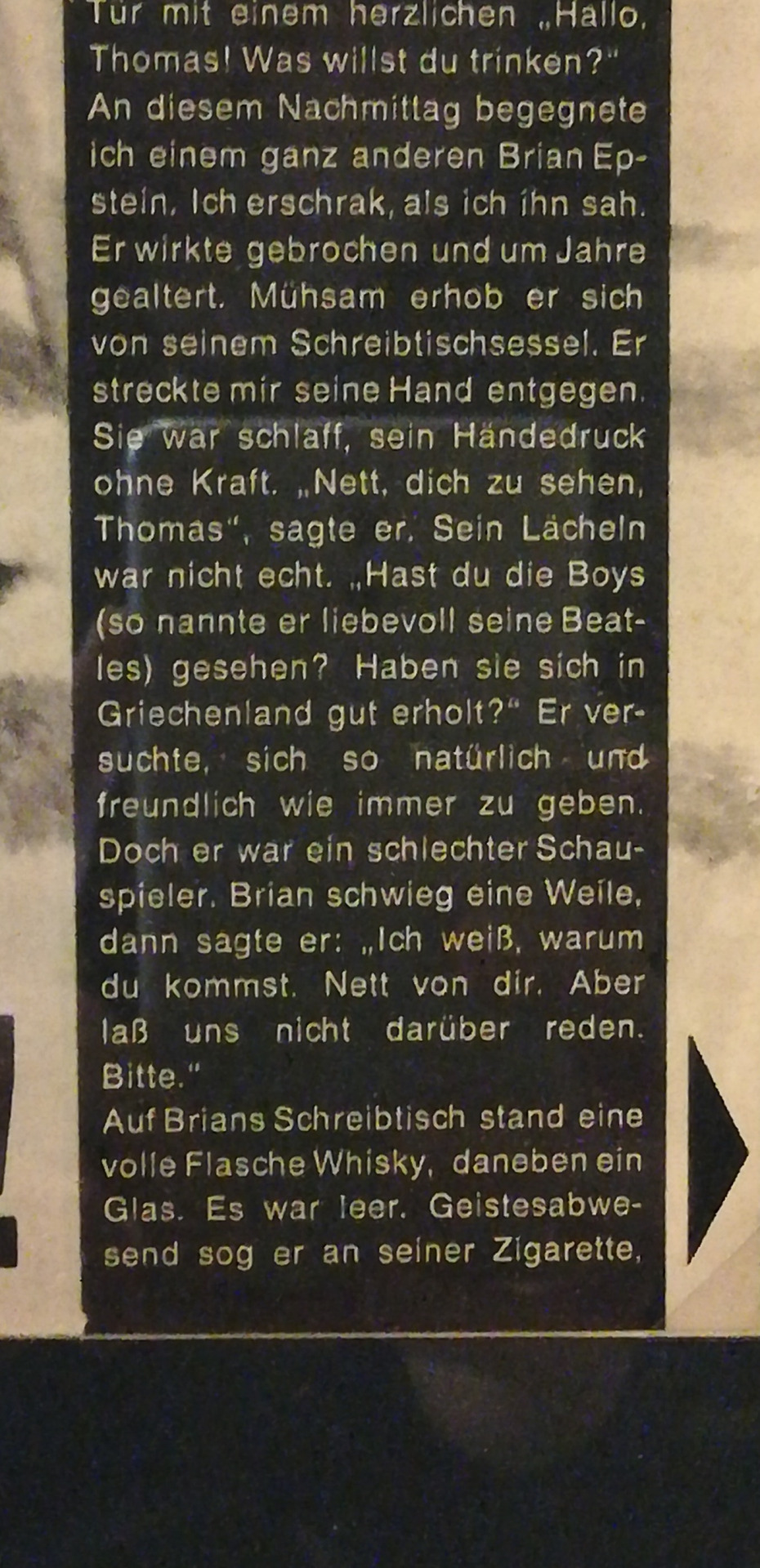

147 notes
·
View notes
Text
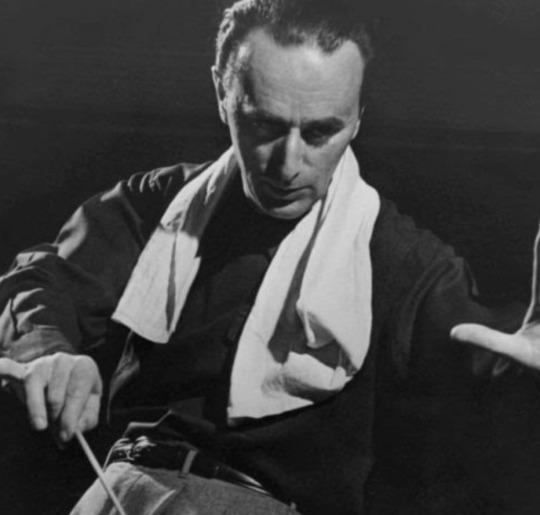
THURSDAY HERO: Herbert Zipper
Herbert Zipper was a conductor and composer who founded a secret orchestra at Dachau, and wrote a song that became an anthem for death camp inmates.
Born in 1904 to an affluent Jewish family in Vienna, Herbert was a musical prodigy who studied at the prestigious Vienna Music Academy with the great composer Richard Strauss. He found employment as a conductor and composer for cabaret shows.
Germany annexed Austria in 1938 and immediately started persecuting Jewish citizens. Herbert was arrested that year and sent by the SS to Dachau, where he became a “horse,” pushing a wheelbarrow loaded with heavy rocks for 12 hours a day. One of the most talented composers in Europe was doing the work of an animal.
Herbert was not the only music man in Dachau. All the Jewish members of the Munich Philharmonic – comprising most of the orchestra – were also incarcerated there. Herbert enlisted the other musicians in an audacious, even insane, plan. They would make instruments and create an orchestra, right there at Dachau.
How could anybody create musical instruments in a concentration camp? They combed the camp for discarded pieces of wood and metal and fashioned eleven primitive yet functional instruments. At least one guard helped the musicians; Herbert requested a piece of wire for a string instrument, and later found it under his pillow.
Herbert’s Dachau orchestra performed concerts for the other inmates every Sunday, in an outhouse. It’s hard to imagine the experience of listening to sublime music in a filthy environment, while knowing they could be all killed for their participation. Herbert said that the concerts were not for entertainment, but rather to bring purpose and even a bit of normalcy back to their lives.
Noted playwright Jura Soyfer, an old friend of Herbert’s from his cabaret days, was also at Dachau. Together they wrote “Dachaulied” (Dachau song), with Herbert composing the haunting music in his head and Jura penning the sad, sardonic lyrics inspired by the concentration camp motto “Work will make you free.” They thought that writing the song would help them maintain some dignity in an atmosphere of constant humiliation and demonization. Herbert deliberately made the song difficult to learn, so that his fellow inmates would have to use all of their concentration and thereby mentally escape from their horrific surroundings. Amazingly, the Nazis never discovered the secret orchestra.
At the end of 1938, Herbert and Jura were transferred to Buchenwald where they taught other inmates the Dachau song. Soon after, Jura died of typhus at age 26, and Herbert lovingly prepared his body for burial. At this time Hitler hadn’t yet began to implement his “Final Solution” to kill all the Jews, which started in 1941. Herbert’s father Emil was in London, desperately trying to get a visa for Herbert and his two brothers to escape Austria. Miraculously, Emil was able to secure his sons’ release from Buchenwald, and they joined him in Paris on March 16, 1939.
During all this time, Herbert’s fiancee, dancer Trudl Dubsky, was working in Manila, in the Philippines. She recommended him for the job of conductor of the Manila Symphony Orchestra, and he was hired, traveling there in September, 1939. Herbert and Trudl were married on October 1. Although it wasn’t a world-class orchestra at the time, Herbert enjoyed working with the Manila Orchestra and under his leadership it improved dramatically. Life was good for Herbert and Trudl until January 1942, when the Japanese army invaded the Philippines and occupied Manila. It was a brutal occupation and once again Herbert was arrested, this time for refusing to conduct the orchestra for Japanese military officers. He was incarcerated and harshly interrogated for four months before being released. For the next three years Herbert and Trudl survived hand-to-mouth, owning no belongings and traveling frequently in search of safe haven in a country at war.
The most difficult period was the Battle of Manila in early 1945. More than once the building where they took shelter was bombed by the Japanese artillery and they escaped with only seconds to spare. In the end of February they were living with hundreds of other displaced people in a seven-story building in Manila that had neither electricity or water. Herbert volunteered to get water every day, a dangerous and difficult undertaking. On the early morning of February 26, 1945, Herbert was on his water run when he saw an opportunity to reach the American front line, and he rushed across a battle field to do it. While there he received a crucial piece of information: the apartment building where he was staying was due to be bombed by the Allies within fifteen minutes! Herbert desperately explained that 800-1000 civilians were inside the building! Due to his pleas, the bombardment was delayed for 45 minutes, giving him just enough time to get back to the building and rescue everyone inside including Trudl.
Until Japan was defeated on September 2, 1945, Herbert worked secretly for the American army under the command of General Douglas MacArthur, transmitting valuable information about Japanese shipping schedules by shortwave radio. When Japan finally surrendered, Herbert organized and conducted a concert of Beethoven’s “Eroica” symphony, a goal he’d set during the darkest hours at Dachau. The concert was performed in a bombed-out church.
Herbert and Trudl immigrated to America in 1946, joining the rest of his family. He co-founded and conducted the Brooklyn Symphony Orchestra, and organized another orchestra especially to give free concerts for public school children. Students called Herbert, who had no children of his own, “Papa Z.” For the rest of his life he volunteered and supported arts education for young people.
Herbert was close friends with poet Langston Hughes and they collaborated on an opera together, “Barrier.” Trudl worked as a ballet tacher. They moved to Chicago in 1953, where Herbert founded the Music Center of the North Shore, and then to Los Angeles, where Herbert directed the School of Performing Arts at USC.
Interviewed by a Los Angeles Times reporter at the end of his life, Herbert said “We have to see the world as it is, but we have to think about what the world could be. That’s what the arts are about.”
Herbert is the subject of a biography, “Dachau Song: The Twentieth Century Odyssey of Herbert Zipper,” and a documentary that was nominated for an Academy Award. His beloved wife Trudl died of lung cancer in 1976. He continued his music for two more decades, conducting his last concert in 1996. Herbert Zipper died in Santa Monica in 1997.
For inspiring concentration camp inmates and inner-city schoolchildren with his music, and for saving hundreds of lives during the Japanese occupation of the Philippines, we honor Herbert Zipper as this week’s Thursday Hero.
Lyrics of Dachau Song:
Barbed wire fraught with death surrounds our world
On which a merciless heaven visits frost and sunburn.
Far from us are all joys, far our home, far the women
When mute we march to work, thousands in the gray dawn.
But we learned the Dachau motto and it made us hard as steel.
Be a man, comrade, remain human comrade
Do good work, pitch in, comrade
Because work, work will make you free!
101 notes
·
View notes
Text
youtube
To make a long story short - due to abuse reasons I only found out I was biracial and Mizrahi Jewish in my twenties and I could only come back to because I was so so sure I was not Jewish Enough, that I didn’t know enough. That being patrilineal meant I wasn’t.
But I remember listening to this and feeling as though I was home. In my soul, in my blood and bones - I was home. I am a biracial Mizrahi Jewish woman - Am Yisrael Chai - through my Persian and Syrian Jewish lines through my bio father, I am enough perhaps. And hearing a Persian Jewish musician sing, it made my heart ache and made me feel loved.
I am olive (trees and skin and..) and pomegranates and brown eyes and water and doves. I am a dancer with jasmine and roses twined in my hair and silk and cotton gowns. I am enough. I live. We live.
(I am my dads family too - those who lived in Poland once and then and then but I am Jewish)
#lils personal aesthetic#jewish biracial fairy princess me#jewish things#this is probably incoherent and sappy as fuck applogies#Youtube
78 notes
·
View notes